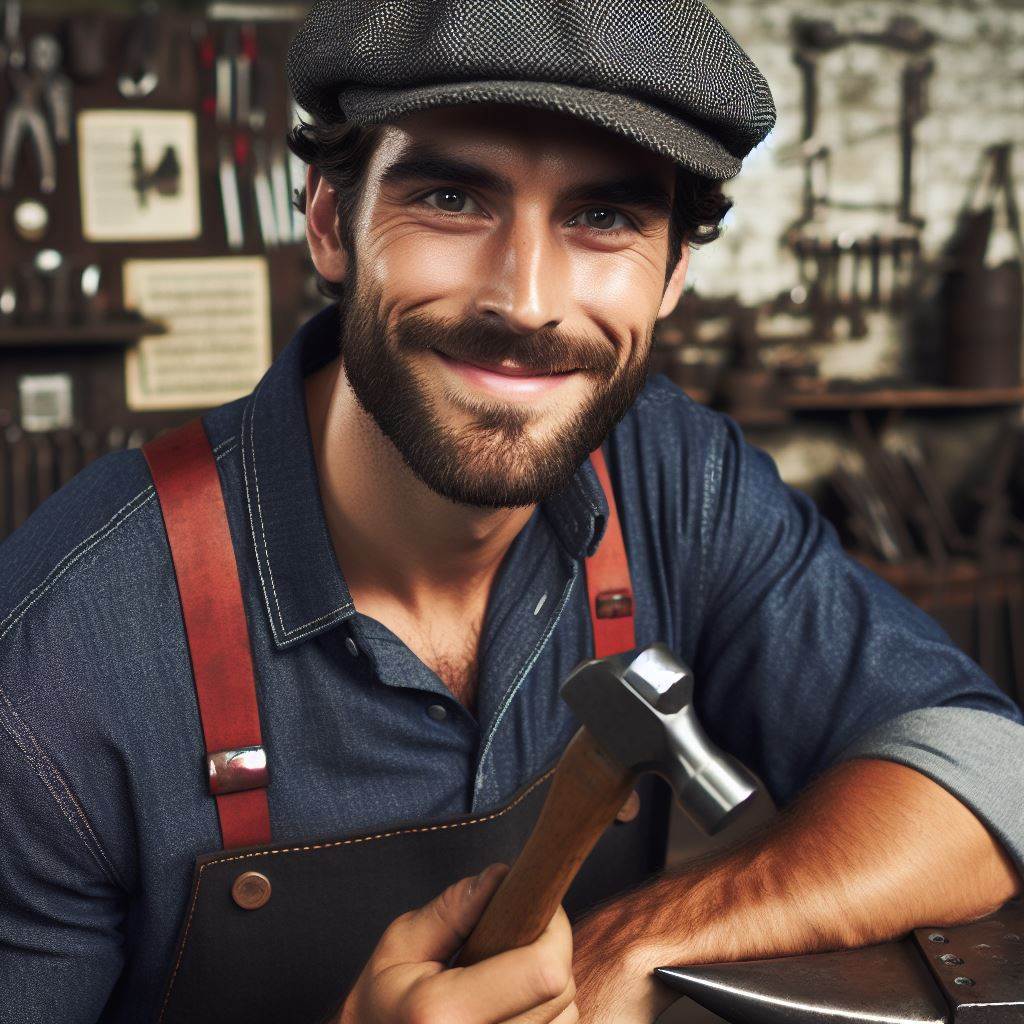Introduction
In many professions, the term “man” has historically been used to describe traditional roles.
These roles have evolved over time to be more inclusive and gender-neutral.
Over time, the significance of professions ending in “man” has shifted.
It reflects societal changes towards gender equality and diversity in the workforce.
The evolution of traditional roles has led to greater representation and opportunities for all individuals.
Professions ending in “man” are no longer limited to one gender or identity.
It is important to recognize and celebrate the progress made in breaking gender stereotypes.
By embracing diversity in professions, we can create a more inclusive and equitable society.
Origins and Historical Significance
Brief history of professions named with “man”
In exploring the origins and historical significance of professions ending in ‘man,’ it is essential to delve into the brief history of these traditional roles.
Dating back centuries, professions such as craftsman, fisherman, and postman were prevalent in societies worldwide.
Cultural and societal reasons for these names
These professions were often named with ‘man’ due to the cultural and societal norms of the time.
Men were primarily the ones engaged in these occupations, leading to the creation of such titles.
The usage of ‘man’ in these roles reflected the gendered division of labor that existed historically.
How these roles were perceived historically
Historically, these roles were perceived as essential and valuable to the functioning of society.
Craftsmen were responsible for creating goods, fishermen provided food for communities, and postmen facilitated communication between people.
These professions helped to sustain communities and foster connections between individuals.
The significance of professions ending in ‘man’ lies in the representation of traditional gender roles and labor divisions.
These names highlight the historical roles that men played in society and the importance of their contributions to various industries.
Overall, the origins and historical significance of professions ending in ‘man’ shed light on the cultural and societal dynamics of the past.
These traditional roles reflect the gendered norms and values that shaped societies and continue to influence perceptions of work and gender roles today.
Transform Your Career Today
Unlock a personalized career strategy that drives real results. Get tailored advice and a roadmap designed just for you.
Start NowRead: Jury Duty Exemptions: Professional Considerations
List of Traditional “man” Professions
Craftsman
Craftsman, the embodiment of skill and dedication, crafts exquisite goods through meticulous handiwork.
Rooted deeply in history, craftsmen have adorned civilizations with their creations, from ancient pottery to intricate woodwork.
In the modern era, the role of the craftsman has evolved alongside technological advancements.
While traditional craftsmanship persists, artisans now integrate innovative techniques and materials into their craft.
This fusion of tradition and innovation ensures the continued relevance and appeal of handmade goods in today’s market.
Fisherman
The fisherman, a stalwart figure in coastal communities, is tasked with harvesting the bounty of the sea to sustain livelihoods and nourish populations.
Their daily routine is marked by early mornings and arduous labor as they navigate the unpredictable waters in search of their catch.
However, the advent of technology has transformed the fishing industry.
Mechanized vessels and sophisticated equipment have increased efficiency but also raised concerns about overfishing and environmental degradation.
Modern fishermen must balance traditional fishing practices with sustainable approaches to ensure the long-term health of marine ecosystems.
Fireman
The fireman, a symbol of bravery and selflessness, stands as the frontline defender against the ravages of fire.
Equipped with rigorous training and specialized equipment, they confront infernos to protect lives and property.
Over time, the role of the fireman has evolved into modern firefighting, encompassing not only fire suppression but also emergency medical response and community education.
Furthermore, the fire service has become increasingly diverse, with women playing integral roles alongside their male counterparts.
Postman
The postman, a familiar face in neighborhoods worldwide, serves as the vital link in the chain of communication, delivering letters and parcels to doorsteps with unwavering reliability.
Their presence fosters a sense of community and connection in an increasingly digital age.
However, the rise of digital communication has posed challenges to the traditional role of the postman.
Email and online messaging have diminished the volume of physical mail, prompting postal services to adapt their operations and explore new avenues of service, such as package delivery and e-commerce logistics.
Showcase Your Business Today
Reach thousands of readers actively exploring professional services. Publish your business profile and grow your audience now.
Publish NowIn short, while these traditional “man” professions have undergone significant changes in response to technological advancements and shifting societal needs, their essence remains rooted in dedication, service, and craftsmanship.
Read: TN Visa Eligible Professions for Americans
The Impact of Language and Gender on Traditional Roles
Language and gender play a significant role in shaping traditional roles and professions.
The terms we use can reflect societal values and beliefs, as well as reinforce certain stereotypes.
In recent years, there has been a growing awareness of the need to use more inclusive language that does not reinforce gender norms.
Gender-neutral terms and inclusivity
Words ending in ‘man’ such as chairman, fireman, and policeman have long been used to describe certain professions.
These terms can be exclusionary and reinforce the idea that certain jobs are only for men.
There is a growing recognition that language shapes our perceptions and can limit opportunities for individuals.
Gender-neutral terms like chairperson, firefighter, and police officer are becoming more common in order to promote inclusivity.
By using language that is more inclusive, we can break down barriers and create a more diverse workforce.
The shift from “man” suffix to more inclusive language in professional titles
Many organizations are making a conscious effort to update their job titles to be more gender-neutral.
For example, stewardess has been replaced with flight attendant and mailman with mail carrier.
These changes reflect a broader shift towards recognizing the contributions of all individuals, regardless of gender.
While some people may resist these changes due to tradition, it is important to consider the impact of language on equality.
By using more inclusive language, we can create a more welcoming and supportive environment for all employees.
In fact, language and gender play a crucial role in shaping traditional roles and professions.
By moving towards more inclusive language, we can help break down barriers and create a more diverse and equitable society.
Read: The ‘Er’ Professions: Careers that Make a Difference

Modern Interpretations and Adaptations
How traditional “man” professions have adapted to modern demands
In today’s fast-paced and ever-changing world, traditional professions ending in “man” have had to adapt to meet the demands and expectations of a modern society.
These professions, once dominated by men, have seen significant changes and expansions in recent years.
Examples of roles that have expanded or changed significantly
One example of a traditional “man” profession that has adapted to modern demands is the role of a businessman.
While historically a male-dominated field, the business world has seen an increase in female leaders and entrepreneurs.
Women are now breaking through the glass ceiling and making their mark in the business world.
Another profession that has evolved significantly is the role of a fireman.
With the advancement of technology and equipment, firefighters are now equipped with state-of-the-art tools to combat fires and save lives.
Additionally, fire departments are now more diverse, with women joining the ranks as firefighters.
The role of a policeman has also seen significant changes in recent years.
Police departments are now more focused on community policing and building relationships with the communities they serve.
This shift towards a more community-oriented approach has helped to improve trust between law enforcement and the public.
In addition to these traditional professions, other roles that have expanded and changed significantly include:
- Businesswoman: Women are now taking on leadership roles in the business world and shaping the future of commerce.
- Firefighter: Fire departments are now more diverse and inclusive, with women playing a vital role in firefighting and rescue efforts.
- Police officer: Law enforcement agencies are focusing more on community policing and building trust with the communities they serve.
In a nutshell, traditional professions ending in “man” have adapted to modern demands by evolving and expanding to meet the needs of a changing society.
With more women taking on leadership roles and diverse individuals joining these professions, the future looks bright for these once male-dominated fields.
Read: ‘-ist’ Endings: Professions with a Special Twist
Conclusion
It’s paramount to grasp the historical trajectory and transformation of traditional professions ending in “man.”
By acknowledging their evolution, we pave the way for a more inclusive and equitable society.
The journey of these professions mirrors broader societal shifts towards diversity and inclusivity.
Embracing linguistic changes, such as replacing gender-specific terms with gender-neutral alternatives, reflects our commitment to inclusivity and respect for all individuals.
It’s not merely a matter of semantics but a reflection of our evolving understanding of gender and societal roles.
As we adapt our language to be more inclusive, we also adapt our mindset, fostering environments where everyone feels valued and respected.
This adaptation extends beyond language to the very structures and norms within professions.
Showcase Your Business Today
Reach thousands of readers actively exploring professional services. Publish your business profile and grow your audience now.
Publish NowRecognizing and addressing gender disparities within traditional professions is essential for progress towards equality.
We must challenge outdated stereotypes and create opportunities for individuals of all genders to thrive in any profession they choose.
Embracing change doesn’t diminish the legacy of traditional professions but rather enhances their relevance in a modern, diverse society.
As we move forward, let’s continue to champion inclusivity and diversity in all aspects of professional life.
Together, we can create a more equitable and welcoming world for future generations.
[E-Books for Sale]
The Big Book of 500 High-Paying Jobs in America: Unlock Your Earning Potential
$19.99 • 500 High-Paying Jobs • 330 pages
Explore 500 high-paying jobs in America and learn how to boost your career, earn more, and achieve success!
See All 500 High-Paying Jobs of this E-Book
1001 Professions Without a Degree: High-Paying American Jobs You Can Start Now
$19.99 • 1001 Professions Without a Degree • 174 pages
Discover 1001 high-paying jobs without a degree! Unlock career tips, skills, and success strategies for just $19.99!




